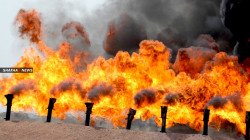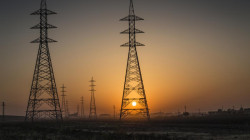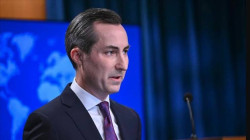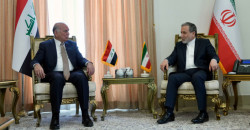From crisis to solutions: Iraq's energy sector at the crossroads of dependency and independence
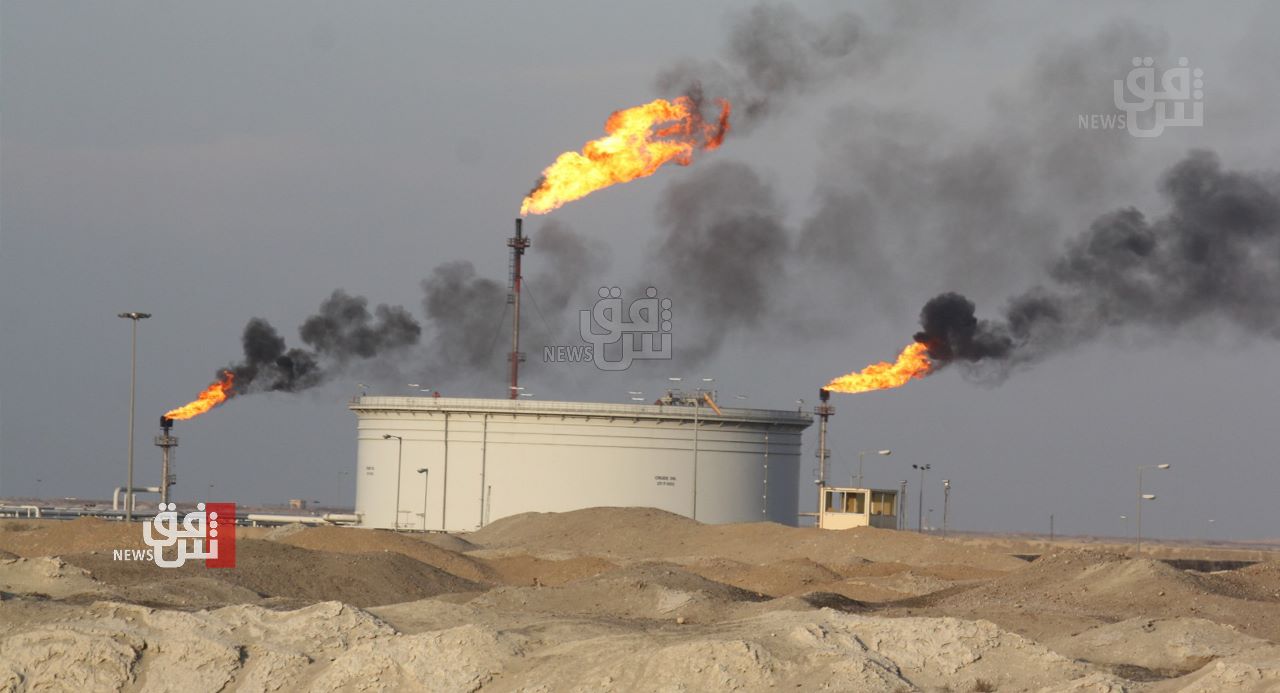
Shafaq News / Amid the intricate web of energy dynamics, Iraq, positioned as the second-largest producer within the Organization of the Petroleum Exporting Countries (OPEC) after Saudi Arabia, struggles with a significant reliance on Iran to meet its electricity and gas demands, ranging between a third and 30-40% due to a shortage in domestic processing infrastructure.
This dependency recently came under scrutiny as a crisis unfolded, showcasing vulnerabilities in Iraq's energy sector.
Any interruption in imports directly affects the provision of electricity to many Iraqi governorates, reflecting the "primitive" gas policy, according to experts, who advocate investing in domestic gas to achieve self-sufficiency and eliminate problems associated with imported gas.
One of the recent crises involving Iranian gas occurred on February 28, as announced by the Iraqi Ministry of Electricity, stating a "complete" halt in Iranian gas supply, leading to the reduction of approximately 4,000 megawatts from the system's generating units.
The Ministry of Electricity stated that "the shortage of supplied gas has completely ceased in the governorates of Al-Furat Al-Awsat and Baghdad, leading to load shedding and a decrease in production of the electrical system."
The ministry's statement indicated "a complete cessation of the transmission lines between Iraq and Iran due to the cold wave, according to the Iranian Ministry of Electricity."
The ministry also stated that it "has been preparing early and is about to complete its comprehensive maintenance of production stations and generating units to be ready for the peak summer loads."
The Iraqi Electricity Ministry emphasized that it is "coordinating extensively with the Ministry of Oil through a continuous operations room to compensate for the shortage with domestically produced fuel and gas until the resumption of supplying the required quantities of gas."
It noted that "some of our production stations operate on domestic gas, while others operate on domestic fuel, while another part of our production stations operates on imported gas due to the inadequacy of domestic gas, which the government is working diligently and intensively to exploit and rely on independently."
Sources informed Shafaq News Agency of a decrease in electricity supply in Baghdad and several governorates due to the halt of "Iranian gas."
Last Tuesday, imported electricity lines from Iran went out of service, and the hours of electricity supply in Diyala decreased.
According to sources, the Iranian electricity lines Mersad and Sarpol-e Zahab, which supply electricity to most areas of Diyala, stopped working and went out of service.
Noteworthy, the expenses of the Ministry of Electricity from 2003 to 2021 exceeded $80 billion, according to experts at the time, in addition to the allocations of the ministry in the budgets of 2022 and 2023, raising the figure to about $100 billion over 20 years.
When will the problems of imported gas end?
"The ongoing challenges associated with imported gas in Iraq could find resolution through strategic investment in domestic gas resources," suggested Basim Al-Gharibawi, a member of the Parliamentary Committee on Oil, Gas, and Natural Resources.
Speaking to Shafaq News Agency, Al-Gharibawi stressed that "past governments bear responsibility for the sector's current state, while the current administration must expedite efforts to capitalize on existing gas reserves."
He highlighted the urgency for swift action, noting that "while solutions exist, delays persist in their implementation due to sluggish investment in oil fields and ineffective gas utilization." While acknowledging the complexity of oil field investment, he emphasized the "need for expedited procedures to initiate crucial gas investment projects promptly."
Highlighting ongoing governmental initiatives, Al-Gharibawi stressed the "necessity for tangible outcomes, urging the selection of reputable companies for project implementation." He emphasized the need for timely action in referring projects to these companies to ensure efficient execution.
The parliamentary committee, according to Al-Gharibawi, "has established subcommittees, including one dedicated to monitoring the gas sector, with ongoing efforts aimed at presenting comprehensive reports and recommendations." These efforts, he asserted, "will culminate in the activation of strategies outlined in these reports in the coming period."
Notably, Iraqi Foreign Minister Fuad Hussein recently affirmed the government's intention to expand natural gas production for export purposes during the "International Trade: Communication and Mutual Reliance" dialogue session at the Third Antalya Diplomacy Forum.
Sixth licensing round
Deputy Prime Minister for Energy Affairs and Minister of Oil, Hayyan Abdul Ghani, announced on June 18, 2023, the launch of the sixth licensing round encompassing 11 promising gas exploration blocks, as per the Iraqi Ministry of Oil.
Abdul Ghani emphasized the ministry's keenness for "optimal investment in Iraq's hydrocarbon wealth in line with the government's program and directives from the Prime Minister to increase reserves through oil and gas exploration."
"This move is part of the ministry's commitment to addressing associated gas from oil operations, transforming it into a productive and beneficial resource to meet local needs, particularly for power generation stations, petrochemicals, fertilizers, and other industries."
Iraq prepares to ramp up its hydrocarbon production by launching the sixth licensing round for oil and gas exploration, targeting exports to global markets to boost the country's economy and provide employment opportunities.
Abdul Ghani noted that the ministry has "completed preparations for the launch of the sixth licensing round, focusing on 11 gas-rich exploration blocks."
In addition, the Minister urged specialized global companies interested in participating in oil and gas exploration, development, and production activities to apply for this round, inviting them to compete for the opportunity to explore and develop the mentioned projects by formally submitting their applications to the ministry.
Primitive gaz policy
Dr. Salah Al-Moussawi, an Iraqi global expert in oil industries, criticized Iraq's gas policy as "primitive and misguided."
"despite inaugurating a gas export port in the Gulf, Iraq remains an importer of gas, indicating the flawed nature of its gas policy."
Dr. Al-Moussawi emphasizes that exporting gas at a low price is "unreasonable" while importing it at a higher cost.
Speaking to Shafaq News Agency, he highlighted a constitutional hurdle that prohibits local or foreign companies from entering investment contracts for oil and gas fields. "this reflects a lack of understanding of gas management."
Regarding potential solutions, Dr. Al-Moussawi suggested several avenues, including "inviting foreign companies to develop gas extraction processes exclusively under Iraqi government auspices, without internal or external partners."
He cited previous collaborations, such as with Shell in Basra in 2009, as problematic examples.
Dr. Al-Moussawi also noted that "gas turbines for electricity generation can utilize gas and other liquid petroleum derivatives. Furthermore, modern methods and technologies can swiftly and completely halt gas flaring, with many gas uses substitutable with naphtha."
Furthermore, Dr. Al-Moussawi advocated for government-led exploratory and investment efforts to harness this resource, highlighting Iraq's abundant gas fields.
He criticized previous arrangements, such as those with Shell in the south, suggesting that "such approaches could lead to a substantial surplus of gas."
As reported by Reuters previously, Iraq continues to flare some extracted gas alongside crude oil due to insufficient facilities for processing and converting it into fuel for local consumption or export.
Despite its rich oil resources, Iraq's infrastructure remains dilapidated due to years of war and chronic corruption. Consequently, Iraq experiences frequent power outages due to this deteriorating infrastructure.
Gas supply from Turkmenistan
Iraq's Minister of Electricity, Ziyad Ali Fadhel, signed a memorandum of understanding with the Turkmenistan State Minister for Gas Affairs on June 10, 2023, to supply Turkmen gas to Iraq.
On February 17, Hassan Al-Asadi, Deputy Chairman of the Parliamentary Electricity and Energy Committee, disclosed an "exception" in the gas supply agreement to Iraq from Turkmenistan.
Al-Asadi stated that "the gas agreement between Iraq and Turkmenistan, signed at the end of 2023, contains an exception that allows the Iraqi government to sign a contract with the Iranian side," explaining that "according to the agreement, Iraq will purchase gas from Turkmenistan, and Turkmenistan, in turn, will send the gas to Iran to benefit from it in northern Iran, and Iraq will import gas from southern Iran."
He added that "the agreement will serve Iraq and solve the problem of sending money for gas imported from Iran due to the US sanctions imposed on the Islamic Republic."
"The problem of imported gas is ongoing and will be addressed by completing the agreement with Turkmenistan and importing gas to meet part of the needs of power plants."
Iraq imports electricity and gas from Iran, ranging from a third to 40% of its energy needs, a matter of great importance, especially in the summer months when temperatures reach 50 degrees Celsius and energy consumption peaks.
Iraq faces difficulty in paying for these imports due to US sanctions that only allow Iran to access funds to purchase non-sanctioned goods such as food and medicine.
Production of the Kurdistan Region
Academic and economic expert Dr. Khaled Haider remarked that the cutoff of Iranian gas supplies to Iraq is not a new issue, attributing it to the Iranian government's claim of Iraq's failure to fulfill its financial obligations—a matter linked to the financial siege imposed on the Iranian economy.
To address this problem, Haider told Shafaq News Agency that "last year, there was an agreement to exempt Iraq for 120 days, and there was also payment for the costs of importing gas from the crude oil, as measures to ensure the continuous and natural flow of gas supplies to Iraq."
Regarding the reliance on domestically produced gas in the Region, he explained that "Kurdistan Region officials confirm a concerted effort to diversify sources of income within the Region's economy, including supporting natural gas and expanding production. Therefore, it is expected that the Iraqi economy will somewhat depend on the Region in addition to importing from Turkmenistan."
As for increasing gas production in Kurdistan, Deputy Minister of Natural Resources in the Kurdistan Regional Government (KRG), Ahmed Al-Mufti, announced a "40% increase in gas production over the past three years, and that "50% of natural gas in Iraq is produced in the Region."
Al-Mufti further revealed that "the Region could significantly increase natural gas production, potentially producing 60% of Iraq's total natural gas production in a short period, with the ministry currently producing 50%."
He emphasized the "increased demand for electricity for this reason, and compared to other regions in Iraq, electricity production in Kurdistan is in a better position."
The potential for developing gas fields and increasing investment in Kurdistan could lead to producing five million cubic feet of gas.
Notably, in February, Iraqi Prime Minister Mohammed Shia Al-Sudani stated that "Iraq would achieve self-sufficiency in gas within three years," emphasizing the government's belief in "investing in associated gas and natural gas to achieve economic reforms."
Iraq is among the nine countries responsible for the majority of gas flaring operations, accounting for nearly half of global oil production.
World Bank data indicates that Iraq is the second-largest country in the world, employing this practice after Russia and before Iran and the United States.
In 2020, Iraq's flared gas volume reached 17.374 million cubic meters.
